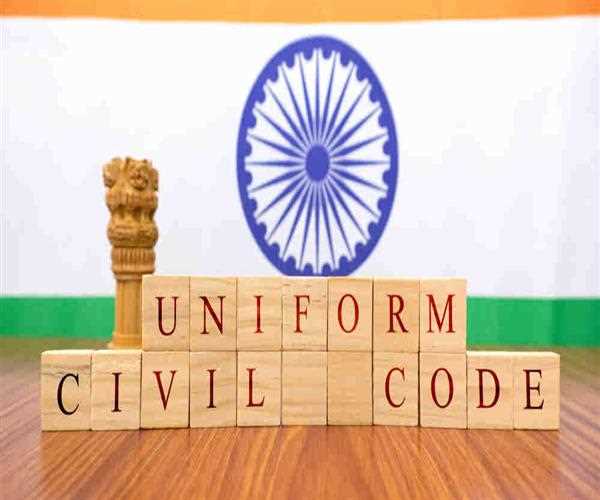
22-Jun-2023 , Updated on 6/23/2023 12:25:01 AM
Explore the solution of religious clothing row in educational institutions with Uniform Civil Code
In today's diverse and multicultural societies, the issue of religious clothing in educational institutions has become a topic of significant debate. The presence of various religious practices and beliefs within a pluralistic society necessitates careful consideration when it comes to creating an inclusive and harmonious environment in educational settings. One potential solution that has gained attention is the implementation of a Uniform Civil Code (UCC).
In this view, we will explore the concept of a Uniform Civil Code and discuss how it can help address the challenges associated with religious clothing in education institutions.
Highlights
- The issue of religious clothing in educational institutions has been a subject of debate and controversy in many countries. In order to address this matter, some proponents suggest implementing a Uniform Civil Code (UCC) as a potential solution.
- When it comes to religious clothing in educational institutions, a UCC could potentially establish a standardized dress code that applies uniformly to all students, regardless of their religious beliefs.
- Proponents argue that a UCC would promote inclusivity, foster a sense of national identity, and reduce instances of religious conflicts within educational institutions.
- Implementing a Uniform Civil Code to address the issue of religious clothing in educational institutions is a complex and sensitive matter. It requires a careful balance between promoting equality and preserving individual freedoms.
- Understanding the Uniform Civil Code
A Uniform Civil Code refers to a set of laws that are applicable to all citizens of a country, irrespective of their religious affiliations. It seeks to establish a common legal framework for personal matters such as marriage, divorce, inheritance, and adoption, among others. The purpose of implementing a UCC is to promote equality, social justice, and gender parity by eradicating the inconsistencies and discriminatory provisions present in various personal laws based on religion.
- Challenges of Religious Clothing in Education Institutions
Religious clothing, such as turbans, hijabs, kippahs, and other religious symbols, often pose challenges within educational institutions. While these garments hold significant religious and cultural value for the individuals wearing them, they can also create divisions, misunderstandings, and conflicts within the school environment.
One of the primary challenges associated with religious clothing is the potential for discrimination and marginalization of students who do not adhere to the same religious practices. This can lead to feelings of exclusion and hinder the formation of a cohesive learning community. Additionally, the presence of religious clothing may give rise to perceptions of favoritism or special treatment, as certain individuals may receive exemptions from standardized dress codes while others do not.

- The Role of Uniform Civil Code
Implementing a Uniform Civil Code can play a pivotal role in resolving these challenges and creating a more inclusive and equitable environment within educational institutions. By adopting a uniform dress code that is applicable to all students, regardless of their religious background, educational institutions can promote unity and equality while respecting individual religious freedoms.
A uniform dress code can serve as a unifying force, ensuring that students are treated equally and fostering a sense of belonging within the educational setting. It can help students focus on their educational pursuits rather than being distracted by differences in appearance or religious symbolism. By implementing a UCC, educational institutions can minimize divisions based on religion and promote a shared sense of identity and purpose.
Benefits of a Uniform Civil Code in Education Institutions
Equality and Non-discrimination- A UCC ensures that all students are subject to the same set of rules and regulations, thereby promoting equality and non-discrimination. It eliminates the potential for favoritism or bias based on religious attire, creating a level playing field for all students.
Secular Education- Education institutions are meant to be secular spaces that provide an unbiased and inclusive learning environment. A UCC helps maintain the secular nature of educational institutions by establishing a common framework that does not prioritize any specific religious practices.
Integration and Social Cohesion- By adopting a uniform dress code, educational institutions encourage integration and social cohesion among students from diverse religious backgrounds. It allows them to focus on their shared goals and values, fostering mutual understanding and respect.
Simplified Administration- Implementing a UCC streamlines administrative processes within educational institutions. Uniform dress codes eliminate the need for subjective judgments and individual exemptions, making it easier for administrators to enforce the rules consistently.
Preparing for a Diverse Society- In an increasingly interconnected world, students need to develop skills that enable them to thrive in diverse environments. A UCC promotes inclusivity and prepares students to navigate a multicultural society, where understanding and respecting different beliefs and practices are crucial. By embracing a uniform dress code, educational institutions help students develop tolerance, empathy, and appreciation for cultural diversity.
- Addressing Concerns and Ensuring Religious Freedom
While the implementation of a Uniform Civil Code can offer numerous benefits, it is essential to address concerns regarding religious freedom and cultural identity. Critics argue that a uniform dress code might infringe upon an individual's right to express their religious beliefs. However, it is important to note that a UCC does not seek to suppress religious freedom but rather aims to balance it with the principles of equality and secularism.

To ensure religious freedom is respected, a UCC can accommodate provisions that allow individuals to wear symbols or articles of religious significance in a non-disruptive manner. For example, turbans, hijabs, or religious jewelry can be worn alongside the uniform, as long as they do not interfere with the educational process or pose safety concerns. It is crucial to strike a balance between upholding religious freedom and maintaining a cohesive educational environment.
- Implementation and Sensitization
Implementing a Uniform Civil Code in educational institutions requires careful planning, dialogue, and sensitization. It is crucial to involve all stakeholders, including students, parents, educators, and religious leaders, in the decision-making process. Engaging in open and respectful discussions can help address concerns, dispel misconceptions, and build consensus.
Additionally, comprehensive sensitization programs and diversity training should be implemented to promote understanding and respect for different religious practices and cultural backgrounds. Such initiatives can help foster an inclusive environment where students feel valued and accepted while learning about the richness of various faith traditions.
The issue of religious clothing in educational institutions calls for a thoughtful and inclusive approach. A Uniform Civil Code offers a viable solution to create an environment that upholds equality, respects religious freedom, and promotes social cohesion. By implementing a uniform dress code applies to all students, irrespective of their religious background, education institutions can foster a sense of unity, minimize divisions, and prepare students for the multicultural societies they will encounter in their lives. It is crucial to engage in open dialogue and sensitization to ensure that religious freedom is respected while creating a harmonious educational environment that values diversity and promotes inclusive learning.

SEO and Content Writer
I am Drishan vig. I used to write blogs, articles, and stories in a way that entices the audience. I assure you that consistency, style, and tone must be met while writing the content. Working with the clients like bfc, varthana, ITC hotels, indusind, mumpa, mollydolly etc. has made me realized that writing content is not enough but doing seo is the first thing for it.
Comments
Join Our Newsletter
Subscribe to our newsletter to receive emails about new views posts, releases and updates.
Copyright 2010 - 2026 MindStick Software Pvt. Ltd. All Rights Reserved Privacy Policy | Terms & Conditions | Cookie Policy